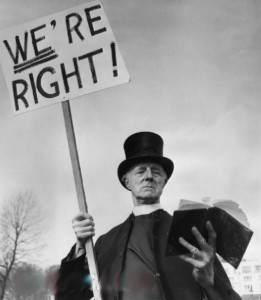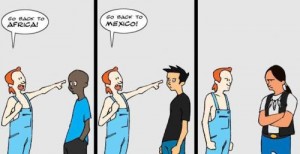In the world we live in today many point to Obama’s election as proof that racism is no longer a problem in American culture, especially when one considers the outright discrimination and racial tensions of the 1960s, just 50 years ago. Keeping with this ideal of a post-racial society, ethnocentrism is often considered a thing of the past, something we look upon as a mark of our progress. Ethnocentrism is judging another culture solely by the values and standards of one’s own culture. By another’s assessment that is heavily biased, the assumption is contemporary Western culture represents the pinnacle of evolutionary achievement (Ashmore 36). We are supposed to look at each other as equals; unfortunately, there is a considerable section of archaeological literature that propagates Western culture at the top of the ladder. (A ladder that was created by Westerners in the first place!)
We discussed in class that everyone, and I mean everyone, is ethnocentric and our cultural biases can limit our understanding. Since it is inherent we suggested that being aware of our bias differentiates those who would rather ignore theirs. Awareness of cultural biases in archaeology is not only extremely pertinent to the field of anthropology but also is critical when conducting archaeological research. Archaeologists cannot fully study and understand another cultural group’s society, customs, and language if they are passing subtle judgment against the very cultural group they are studying.
Sonya Atalay explains the problem of ethnocentrism in archaeology in her article, “Indigenous Archaeology as Decolonizing Practice,” and proposes numerous suggestions to change this ongoing but veiled practice in archaeology. Atalay suggests that indigenous archaeology will make the field more inclusive, represent America’s national diversity in archaeology, and involve indigenous communities in archaeological studies. Overall, the goal of indigenous archaeology is to dismantle the “long-held Western way of viewing archaeology, the past, and heritage” (Atalay 284).
Ethnocentrism has no place in archaeology because one is already studying the past meaning there is already information that is unknown; when ethnocentric ideals are added one is further limiting the amount of knowledge that is possibly obtainable. Thus, there is an overall lack of understanding for a cultural group which is detrimental to the overall goal of the discipline of archaeology.
Wendy Ashmore and Robert J. Sharer state in their book Discovering Our Past: A Brief Introdcution to Arcaheology, “each society’s development is conditioned by the natural ecological setting in which it occurs, the neighboring societies with which it interacts, and its own traditions” (Ashmore 37). Every group has a unique set of circumstances that shape the development of its society; therefore, it is impossible to compare a society to another because too many factors impact and shape the society itself. The process of decolonizing archaeology is an extensive one but it can be done; the growing number of indigenous archaeologists have already made headway. Ethnocentrism is inherent in everyone but that does not mean it should be ignored.



Cultural relativism, to which Wendy Ashmore and Robert J. Sharer are referring in the quote you used, is a critical concept and a real turning point in the history of anthropology. Franz Boas, often called the “Father of American Anthropology,” developed this idea to combat the racist, pseudo-scientific evolutionary “rungs” on which different races were placed by some of his contemporaries. His 1887 Science magazine article “Museums of Ethnology and their Classification” elaborated on this point; in the piece, he wrote that “civilization is not something that is absolute, but…is relative…and our ideas and conceptions are only as true as civilization goes.” Cultural relativism has guided anthropology ever since, but defeating ethnocentrism means confronting deeply ingrained prejudices and biases and is therefore not as simple as it sounds, as the quote from Sonya Atalay that you chose deftly points out.
Pingback: Intercultural Communication The Language Of The World. | themindofsamjones